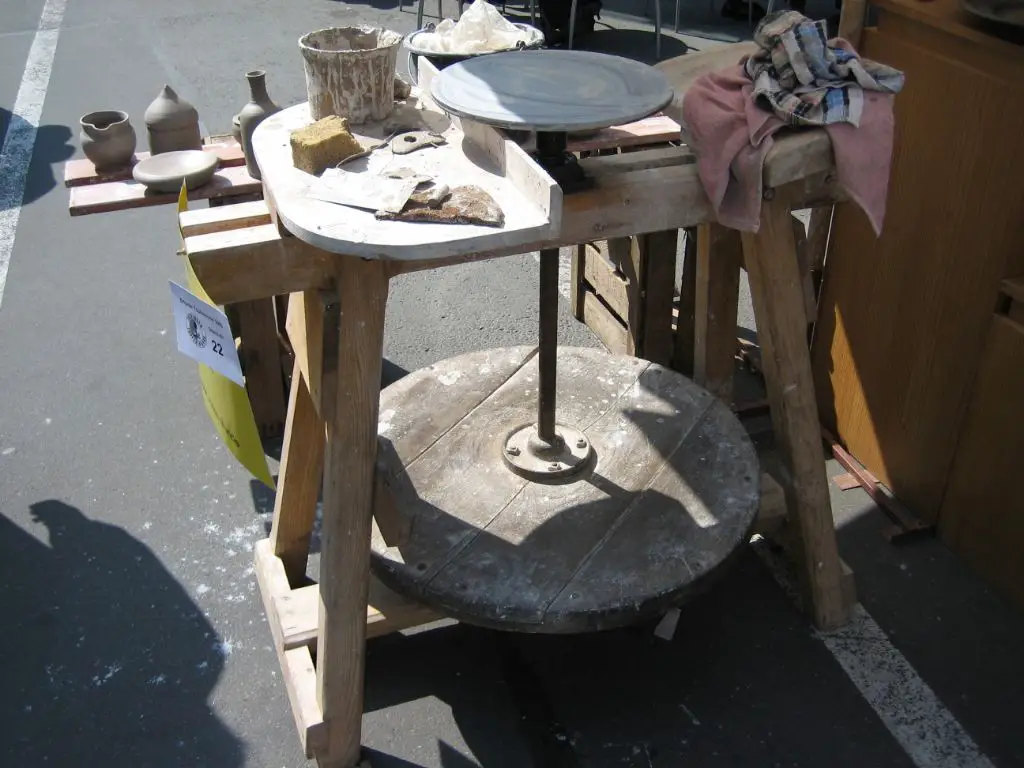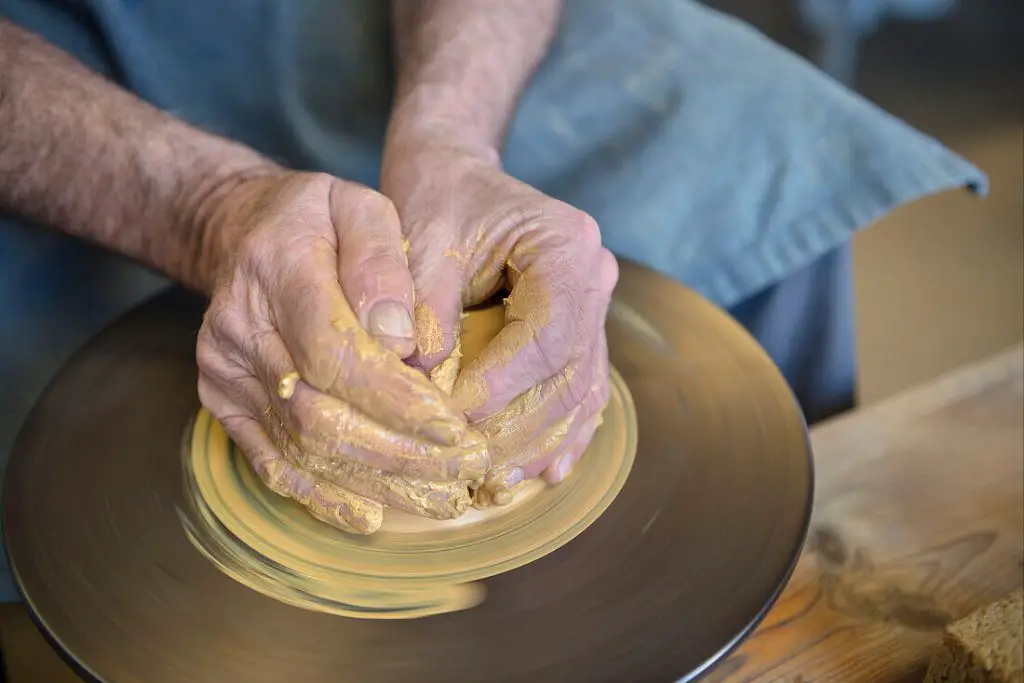What Does The Potter’S Wheel Represent In The Bible?
The potter’s wheel is a symbol that appears several times throughout the Bible. It represents the creative power of God in shaping humanity for His purposes. The potter’s wheel imagery conveys important spiritual lessons about the relationship between God the Potter and humanity as the clay. God is sovereign, all-powerful, and actively molds people according to His will. Yet the clay also has a will and can choose to respond to the Potter’s work. The potter’s wheel symbolizes how God patiently works in people’s lives to shape them into useful vessels for His glory.
Old Testament References
The potter’s wheel is mentioned several times in the Old Testament, mainly in the books of Isaiah and Jeremiah. Two key verses are:
Isaiah 64:8 – “Yet you, Lord, are our Father. We are the clay, you are the potter; we are all the work of your hand.” This verse uses the metaphor of God as the potter and humanity as the clay. It conveys that God is the creator who shapes and molds humanity.
Jeremiah 18:3-6 – “So I went down to the potter’s house, and I saw him working at the wheel. But the pot he was shaping from the clay was marred in his hands; so the potter formed it into another pot, shaping it as seemed best to him.” This passage describes the prophet Jeremiah watching a potter at work, a metaphor for God’s power to reshape Israel for His purposes.[Source]
New Testament References

The potter’s wheel metaphor is also used in the New Testament to illustrate God’s sovereignty and purpose. In Romans 9:20-21, the apostle Paul references Isaiah’s metaphor, saying: “But who are you, O man, to answer back to God? Will what is molded say to its molder, ‘Why have you made me like this?’ Has the potter no right over the clay, to make out of the same lump one vessel for honorable use and another for dishonorable use?” (ESV) https://www.biblegateway.com/passage/?search=Romans+9%3A20-21&version=ESV
This demonstrates that individuals are like clay, subject to the will and purposes of God as the divine Potter. Though some vessels are made for “dishonorable use” and others for “honorable use,” it is not humanity’s place to question God’s motives and plans. The metaphor emphasizes God’s complete authority over creation to shape it according to His purposes.
God as the Potter
The Bible often uses the metaphor of God as a potter molding clay to describe God’s relationship with humanity. This analogy emphasizes God’s creative power and sovereignty over His creation. As the Potter, God takes the “clay” of humanity and carefully shapes each person according to His purposes.
Several key biblical passages use this metaphor. In Isaiah 64:8, Isaiah declares, “Yet you, Lord, are our Father. We are the clay, you are the potter; we are all the work of your hand.” The prophet Jeremiah received a vision from God instructing him to go to the potter’s house. There God showed Jeremiah the potter shaping a flawed clay vessel, then reworking it into something good, demonstrating His patient craftsmanship (Jeremiah 18:1-6).
The metaphor highlights how God is intimately involved in shaping the character and life of each person. Just as a potter molds clay into a vessel, God molds humanity into something beautiful and useful for His glory. Yet God also graciously reworks what has been marred by sin. Like the potter’s wheel keeps turning while imperfections are refined, God patiently transforms His people over a lifetime.
This image conveys how yielding to the Potter allows believers to become more Christlike. As God’s hands shape the clay, believers must surrender and trust the loving purpose He has for their lives (https://www.openbible.info/topics/potter_and_the_clay). The metaphor offers hope that the Creator can make something beautiful even from a flawed lump of clay.
Humanity as the Clay

The Bible often refers to humanity as the clay that is molded by God’s hands, the master Potter. This imagery emphasizes that human beings are formed and shaped by God, the all-powerful Creator. Just as a potter has complete power over reshaping the clay on the wheel, God has sovereignty over His creation and providentially guides the lives of people (What Does the Bible Say About Clay?). The clay metaphor highlights that human beings are dependent on God for their very existence and purpose.
The prophet Jeremiah stated, “But now, O Lord, you are our Father; we are the clay, and you are our potter; we are all the work of your hand” (Jeremiah 18:6). Isaiah also echoed this in saying, “Yet you, Lord, are our Father. We are the clay, you are the potter; we are all the work of your hand” (Isaiah 64:8). The clay has no power in and of itself – it is entirely dependent on the potter’s will.
The Apostle Paul expanded on this concept in Romans 9, explaining that God as the Potter has the right to make from the same lump of clay both vessels for honorable use and vessels for common use (Romans 9:21). This affirms God’s complete sovereignty and control over His creation to mold people according to His purposes.
Overall, the biblical metaphor of humanity as clay highlights that all people are formed by God’s hand and subject to His shaping influences throughout their lives. As His creation, human beings do not have absolute free will but rather are called to submit to the Potter’s leading as the true purpose and meaning in life is found in yielding to Him.
Lessons from the Potter’s Wheel
The metaphor of the potter’s wheel teaches several spiritual lessons about God’s relationship with humanity. As the prophet Jeremiah wrote, “Like clay in the hand of the potter, so are you in my hand, house of Israel” (Jeremiah 18:6). This imagery emphasizes God’s sovereignty and control over human lives, just as a potter has complete authority over the clay.
At the same time, the flaws and imperfections in the clay represent the faults and sins within human nature. As the apostle Paul wrote, “We have this treasure in jars of clay to show that this all-surpassing power is from God and not from us” (2 Corinthians 4:7). Our human weakness highlights God’s glory and strength.
The potter’s wheel also illustrates the patience and care required in shaping clay into a beautiful vessel. God persists in molding His followers, even when defects emerge. As one pastor said, “God isn’t finished with you yet. God is still at work in you. He is applying His great, loving fingers to your life. He’s molding you, shaping you, fashioning you into the person He wants you to be” (Source).

Overall, the metaphor encourages submission to the Potter’s guidance and trust in His vision for our lives. Though the process may be difficult, the result will be vessels prepared for every good work (2 Timothy 2:21).
Vessels of Honor and Dishonor
The Bible uses the metaphor of clay vessels to represent how God molds people into instruments of honor or dishonor. This concept is referenced in 2 Timothy 2:20-21 (King James Version): “If a man therefore purge himself from these, he shall be a vessel unto honour, sanctified, and meet for the master’s use, and prepared unto every good work. If a man therefore purge himself from these, he shall be a vessel unto honour, sanctified, and meet for the master’s use, and prepared unto every good work.”
The passage indicates that by purging ourselves of wickedness and pursuing righteousness, we can become vessels of honor—useful instruments set apart and ready for the Master’s good work. However, if we cling to sin and impurity, we risk becoming vessels of dishonor. As the metaphorical clay, we must yield to the Potter’s molding if we hope to be shaped into vessels of honor.
This speaks to the importance of cooperating with God’s sanctifying work in our lives. Just as clay has no power in itself, we only become vessels of honor when we surrender to the Potter’s hands. Our yielding allows Him to shape us into sanctified and useful instruments for every good work.
The Potter’s Power
The metaphor of God as the Potter and humanity as the clay emphasizes God’s absolute power and authority over His creation. As the Potter, God has the right to make vessels for honorable use or dishonorable use out of the clay (Romans 9:21). This illustrates God’s complete sovereignty and control.
Several verses highlight God’s power and authority as the Potter:
“But now, O Lord, you are our Father; we are the clay, and you are our potter; we are all the work of your hand.” (Isaiah 64:8, https://www.openbible.info/topics/potter_and_the_clay)
“Woe to him who strives with him who formed him, a pot among earthen pots! Does the clay say to him who forms it, ‘What are you making?’ or ‘Your work has no handles’?” (Isaiah 45:9, https://onepassion.org/2019-3-28-the-potter-and-the-clay-romans-919-24/)
As the sovereign Potter, God has complete creative control to shape humanity according to His purposes. The metaphor emphasizes God’s might and authority over all creation.
The Wheel Keeps Turning
One of the most impactful lessons from the potter’s wheel is that it represents the continual process of being molded and shaped by God. As believers, we are never “finished” works, but constantly being refined and perfected throughout our lives (Philippians 1:6). Just as a potter places a flawed clay pot back on the wheel to remold it, God patiently works in our lives to shape us into vessels of honor fit for His use (Romans 9:21).
The potter’s wheel does not stop turning and shaping pots until the potter decides the work is complete. In the same way, God continues working in our lives throughout our Christian walk, gradually molding our character to become more Christ-like (2 Corinthians 3:18). Even when we feel marred and flawed, God never discards us. He lovingly places us back on the wheel to refine us and work out the imperfections in our character (Jeremiah 18:4-6).
The process of sanctification is often pictured as a potter continually working at his wheel. As Dallas Willard said, “spiritual formation is God’s gracious process by which he shapes us over our lifetime into the image of Jesus.” Like clay yielding to the potter’s hands, we must surrender to God’s work in our hearts and continually yield to Him as He molds us into vessels of honor. The wheel keeps turning throughout the lifelong process of being conformed and refined in His hands.
Source: Refined In His Hands
Conclusion
In summary, the potter’s wheel is used throughout the Bible as a metaphor for God’s relationship to humanity. In the Old Testament, it represents God as the potter skillfully shaping His people Israel. Though they often rebelled, He patiently reworked them like clay. In the New Testament, it illustrates God molding believers into the image of Christ. Our lives are in the Potter’s hands as He sovereignly works all things for our good. The metaphor teaches us to humbly submit to God’s will, trusting that He is carefully forming us into holy vessels. Though the process can be painful, the Potter’s wheel keeps turning until we are transformed for our Master’s use. This powerful imagery reminds us of our Creator’s authority and inspires us to yield ourselves willingly to be molded into what He desires.





